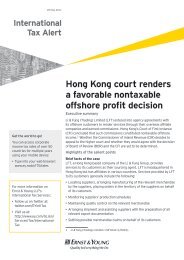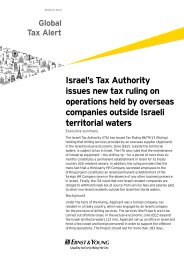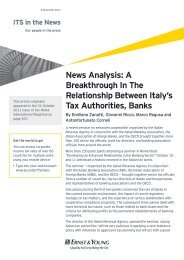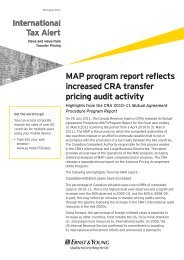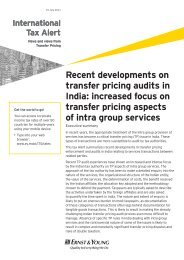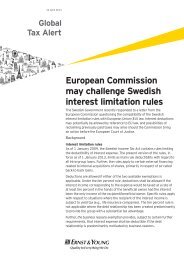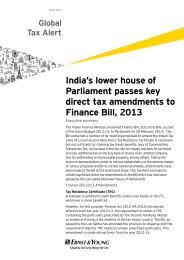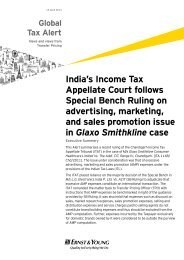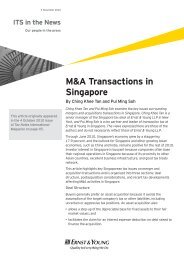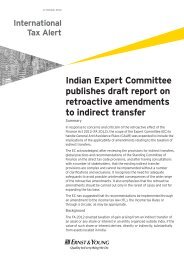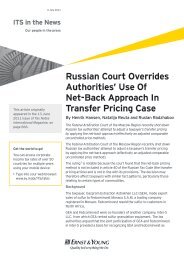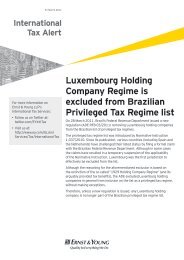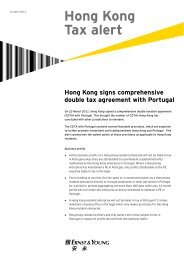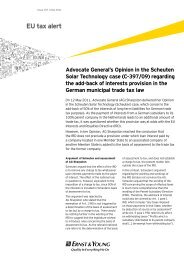Japan and the Netherlands sign new tax treaty - Ernst & Young T ...
Japan and the Netherlands sign new tax treaty - Ernst & Young T ...
Japan and the Netherlands sign new tax treaty - Ernst & Young T ...
You also want an ePaper? Increase the reach of your titles
YUMPU automatically turns print PDFs into web optimized ePapers that Google loves.
7 September 2010<br />
International<br />
Tax Alert<br />
<strong>Japan</strong> <strong>and</strong> <strong>the</strong> Ne<strong>the</strong>rl<strong>and</strong>s<br />
<strong>sign</strong> <strong>new</strong> <strong>tax</strong> <strong>treaty</strong><br />
Executive summary<br />
On 25 August 2010, <strong>the</strong> Ministry of Finance of <strong>Japan</strong> <strong>and</strong> <strong>the</strong> Ministry of<br />
Finance of <strong>the</strong> Ne<strong>the</strong>rl<strong>and</strong>s announced that <strong>the</strong>y <strong>sign</strong>ed a <strong>new</strong> <strong>tax</strong> <strong>treaty</strong><br />
(New Treaty) for <strong>the</strong> avoidance of double <strong>tax</strong>ation.<br />
The New Treaty contains reduced withholding rates primarily for<br />
dividends, interest <strong>and</strong> royalties to encourage mutual investments <strong>and</strong><br />
trade between <strong>Japan</strong> <strong>and</strong> <strong>the</strong> Ne<strong>the</strong>rl<strong>and</strong>s. Following <strong>the</strong> trend of recent<br />
treaties concluded by <strong>Japan</strong>, <strong>the</strong> New Treaty contains various provisions<br />
to prevent <strong>treaty</strong> abuse (among o<strong>the</strong>rs, a <strong>new</strong> Limitation on Benefits<br />
(LOB) article , a provision for hybrid entities, as well as (in <strong>the</strong> Protocol) a<br />
provision allowing <strong>Japan</strong> to <strong>tax</strong> distributions from a Tokumei Kumiai (TK)<br />
agreement).<br />
To enhance mutual investments, <strong>the</strong> following reduced withholding <strong>tax</strong><br />
rates are proposed:<br />
Dividends<br />
Qualifying dividends<br />
(Minimum shareholding) O<strong>the</strong>r<br />
Interest Royalties<br />
Current <strong>treaty</strong> 5% (25%) 15% 10% 10%<br />
New <strong>treaty</strong><br />
0% (50%)<br />
5% (10%)<br />
10%<br />
0% (e.g., banks)<br />
10% (o<strong>the</strong>r)<br />
Both countries have stated <strong>the</strong>ir intent to implement <strong>the</strong> <strong>treaty</strong> before 1<br />
January 2011, although this target date may be optimistic.<br />
The New Treaty is an important improvement to <strong>the</strong> current <strong>treaty</strong> <strong>and</strong><br />
would encourage investments from <strong>Japan</strong> into <strong>the</strong> Ne<strong>the</strong>rl<strong>and</strong>s, <strong>and</strong> vice<br />
versa. In addition, <strong>the</strong> New Treaty should enable certain United States<br />
<strong>and</strong> o<strong>the</strong>r foreign investors to invest in <strong>Japan</strong> through <strong>the</strong> Ne<strong>the</strong>rl<strong>and</strong>s<br />
0%
2<br />
<strong>and</strong> benefit from <strong>the</strong> reduced<br />
withholding <strong>tax</strong> rates, including<br />
<strong>the</strong> 0% withholding <strong>tax</strong> rate for<br />
dividends, <strong>and</strong> o<strong>the</strong>r benefits of <strong>the</strong><br />
<strong>treaty</strong>.<br />
Main features<br />
Residence<br />
A person is considered resident of<br />
a country if such person is liable to<br />
<strong>tax</strong> under <strong>the</strong> laws of that country<br />
by reason of his domicile, residence,<br />
place of head office, place of<br />
management or any o<strong>the</strong>r criterion<br />
of a similar nature. This definition<br />
also applies to a qualifying pension<br />
fund. In <strong>the</strong> case of dual residency,<br />
a person (o<strong>the</strong>r than an individual)<br />
shall be deemed to be resident<br />
in <strong>the</strong> country where its head (or<br />
main) office is located.<br />
Dividend income<br />
The general withholding <strong>tax</strong> rate<br />
on dividend distributions is limited<br />
to 10%. The withholding <strong>tax</strong> rate is<br />
reduced to 5% for situations where<br />
<strong>the</strong> recipient of <strong>the</strong> dividends is<br />
a company that is <strong>the</strong> beneficial<br />
owner of shares representing at<br />
least 10% of <strong>the</strong> voting rights of <strong>the</strong><br />
company making <strong>the</strong> distribution,<br />
provided it has owned those<br />
shares for a period of at least<br />
6 months before <strong>the</strong> dividend<br />
is determined. Dividends are<br />
exempt from withholding <strong>tax</strong> if <strong>the</strong><br />
company receiving <strong>the</strong> dividends<br />
is <strong>the</strong> beneficial owner <strong>and</strong> owns<br />
shares representing at least 50% of<br />
<strong>the</strong> voting power of <strong>the</strong> company<br />
making <strong>the</strong> distribution, <strong>and</strong> has<br />
owned those shares for a period<br />
of 6 months ending on <strong>the</strong> date on<br />
which entitlement to <strong>the</strong> dividends<br />
is determined. In addition, to be<br />
eligible for <strong>the</strong> zero withholding<br />
<strong>tax</strong> rate, <strong>the</strong> receiving entity must<br />
meet one of <strong>the</strong> conditions under<br />
<strong>the</strong> LOB provision as detailed below.<br />
The full exemption of withholding<br />
<strong>tax</strong> on dividend distributions applies<br />
also to any distributions made to<br />
pension funds that meet <strong>the</strong> LOB<br />
provision.<br />
The reduced dividend withholding<br />
<strong>tax</strong> rates are not available for<br />
certain deductible dividends, such<br />
as distributions from a REIT, <strong>and</strong><br />
dividends paid on certain preferred<br />
shares or o<strong>the</strong>r similar interests<br />
unless an ultimate beneficial owner<br />
is a resident of a 3rd country <strong>and</strong> a<br />
<strong>treaty</strong> between <strong>the</strong> payor country<br />
<strong>and</strong> <strong>the</strong> 3rd country provides<br />
equivalent or more favourable<br />
benefits if <strong>the</strong> 3rd country resident<br />
owned equivalent preferred shares<br />
or o<strong>the</strong>r similar interests.<br />
With respect to <strong>the</strong> Ne<strong>the</strong>rl<strong>and</strong>s,<br />
liquidation distributions or income<br />
from <strong>the</strong> buyback of shares fall<br />
under <strong>the</strong> dividend article.<br />
Interest income<br />
The withholding <strong>tax</strong> rate on interest<br />
payments remains at 10%, provided<br />
<strong>the</strong> recipient is <strong>the</strong> beneficial<br />
owner of <strong>the</strong> interest income. If<br />
<strong>the</strong> beneficial owner meets <strong>the</strong><br />
LOB provisions, a full exemption<br />
from withholding <strong>tax</strong> on interest is<br />
granted if <strong>the</strong> interest is beneficially<br />
owned by:<br />
1. <strong>the</strong> government, political<br />
subdivision or local authority<br />
of <strong>the</strong> country of which<br />
<strong>the</strong> recipient is a resident,<br />
including <strong>the</strong> central bank or<br />
any institution owned by that<br />
government;<br />
International Tax Alert<br />
2. a resident on debt-claims<br />
guaranteed, insured or<br />
indirectly financed by any of <strong>the</strong><br />
government institutions included<br />
under point 1. above;<br />
3. a resident that is a bank,<br />
insurance company, securities<br />
company or any o<strong>the</strong>r enterprise<br />
that in <strong>the</strong> 3 years preceding <strong>the</strong><br />
interest payment derived more<br />
than 50% of its liabilities from<br />
bonds issued in <strong>the</strong> financial<br />
markets or from taking deposits<br />
<strong>and</strong> more than 50% of <strong>the</strong> assets<br />
consist of debt-claims against<br />
persons that are not considered<br />
associated companies as defined<br />
under Article 9 of <strong>the</strong> New<br />
Treaty;<br />
4. a pension fund;<br />
5. a resident <strong>and</strong> is paid with<br />
respect to debt resulting<br />
from <strong>the</strong> sale on credit of any<br />
equipment, merch<strong>and</strong>ise or<br />
service;<br />
The 10% <strong>and</strong> 0% rates will not<br />
apply in <strong>the</strong> case of interest paid<br />
on debt-claims if <strong>the</strong> entity owning<br />
that debt-claim owes interest on <strong>the</strong><br />
debt-claim to ano<strong>the</strong>r person that<br />
would not have been able to enjoy<br />
<strong>the</strong> same (or better) withholding<br />
<strong>tax</strong> rates if it would have owned <strong>the</strong><br />
debt-claim against <strong>the</strong> entity that<br />
pays <strong>the</strong> interest directly.<br />
Royalty income<br />
Royalty payments are fully<br />
exempt from withholding <strong>tax</strong> if <strong>the</strong><br />
recipient is <strong>the</strong> beneficial owner of<br />
<strong>the</strong> royalties <strong>and</strong> meets <strong>the</strong> LOB<br />
provision.
The exemption of withholding<br />
<strong>tax</strong> will not apply if <strong>the</strong> entity<br />
receiving <strong>the</strong> royalties for <strong>the</strong> use<br />
of intangible property pays royalties<br />
for <strong>the</strong> use of <strong>the</strong> same intangible<br />
property to ano<strong>the</strong>r person that<br />
would not have been able to enjoy<br />
<strong>the</strong> same (or better) withholding <strong>tax</strong><br />
rates if it would have received <strong>the</strong><br />
royalties for <strong>the</strong> use of intangible<br />
property directly (from <strong>the</strong> endlicensee).<br />
Capital gains<br />
Capital gains derived by a resident<br />
arising from <strong>the</strong> disposal of<br />
immovable property will be <strong>tax</strong>able<br />
in <strong>the</strong> country where <strong>the</strong> immovable<br />
property is located.<br />
Capital gains derived by a resident<br />
from <strong>the</strong> disposal of shares in a<br />
company, interest in a partnership<br />
or trust where <strong>the</strong> value of such<br />
shares or interest consists directly<br />
or indirectly of more than 50% of<br />
immovable property located in<br />
<strong>the</strong> o<strong>the</strong>r country may be <strong>tax</strong>ed<br />
in <strong>the</strong> o<strong>the</strong>r country unless <strong>the</strong><br />
relevant class of <strong>the</strong> shares or<br />
interest is traded on a recognized<br />
stock exchange specified in <strong>the</strong><br />
LOB provision <strong>and</strong> that resident<br />
<strong>and</strong> related persons own in <strong>the</strong><br />
aggregate 5% or less of that class of<br />
shares or interest.<br />
Capital gains on shares acquired by<br />
a resident after <strong>the</strong> entry into force<br />
of <strong>the</strong> New Treaty in a financial<br />
institution of <strong>the</strong> o<strong>the</strong>r country,<br />
which receives substantial financial<br />
assistance from <strong>the</strong> o<strong>the</strong>r country<br />
in connection with imminent<br />
insolvency of that financial<br />
institution will be <strong>tax</strong>able in <strong>the</strong><br />
o<strong>the</strong>r country for a period of 5<br />
years after <strong>the</strong> financial assistance<br />
has started.<br />
Taxation rights with regard to o<strong>the</strong>r<br />
capital gains are exclusively granted<br />
to <strong>the</strong> resident country, following<br />
<strong>the</strong> normal OECD <strong>treaty</strong> provision,<br />
which means that for disposal of<br />
shares <strong>the</strong> right to levy capital gains<br />
is allocated to <strong>the</strong> country of <strong>the</strong><br />
alienator.<br />
Capital gain <strong>treaty</strong> protection is only<br />
available if <strong>the</strong> resident satisfies <strong>the</strong><br />
LOB provision.<br />
TK distributions<br />
Any income or gains derived by a<br />
resident of <strong>the</strong> Ne<strong>the</strong>rl<strong>and</strong>s from<br />
a TK, a silent partnership, or o<strong>the</strong>r<br />
similar contract, may be <strong>tax</strong>ed<br />
by <strong>Japan</strong> in accordance with its<br />
domestic laws.<br />
O<strong>the</strong>r income<br />
O<strong>the</strong>r income is generally <strong>tax</strong>able<br />
only in <strong>the</strong> resident country of <strong>the</strong><br />
beneficial owner of such income.<br />
However, in cases where, due to a<br />
special relationship between <strong>the</strong><br />
resident <strong>and</strong> <strong>the</strong> payor, or between<br />
<strong>the</strong>m <strong>and</strong> a third person, <strong>the</strong><br />
amount of o<strong>the</strong>r income exceeds<br />
<strong>the</strong> arm’s length amount of income,<br />
<strong>the</strong> excess amount of o<strong>the</strong>r income<br />
may be <strong>tax</strong>ed in both countries<br />
according to <strong>the</strong>ir domestic laws.<br />
Hybrid entities<br />
Detailed rules apply to determine<br />
if, <strong>and</strong> under which conditions,<br />
<strong>treaty</strong> benefits will be applicable to<br />
income derived by hybrid entities.<br />
In essence, <strong>the</strong>se rules are aimed<br />
International Tax Alert<br />
at avoiding abuse of <strong>the</strong> <strong>treaty</strong><br />
in situations where an entity is<br />
treated differently in <strong>the</strong> two <strong>treaty</strong><br />
countries.<br />
LOB provisions<br />
Perhaps <strong>the</strong> most important change<br />
in <strong>the</strong> New Treaty is <strong>the</strong> introduction<br />
of a so-called Limitation on Benefits<br />
provision. Broadly speaking, this<br />
provision aims to prevent non-<br />
<strong>Japan</strong>ese <strong>and</strong> non-Dutch investors<br />
from accessing <strong>treaty</strong> benefits that<br />
<strong>the</strong>y would o<strong>the</strong>rwise be unable<br />
to obtain by investing directly<br />
into ei<strong>the</strong>r country. In general,<br />
genuine <strong>Japan</strong>ese investors/<br />
companies investing in/or through<br />
<strong>the</strong> Ne<strong>the</strong>rl<strong>and</strong>s <strong>and</strong> genuine Dutch<br />
investors/companies investing in/<br />
or through <strong>Japan</strong> should have<br />
access to <strong>the</strong> benefits of <strong>the</strong> New<br />
Treaty. Moreover, United States<br />
<strong>and</strong> o<strong>the</strong>r foreign investors could<br />
also benefit from <strong>the</strong> New Treaty<br />
benefits, including <strong>the</strong> 0% dividend<br />
withholding <strong>tax</strong> rate <strong>and</strong> capital<br />
gains <strong>tax</strong> protection, accorded<br />
to <strong>Japan</strong>ese <strong>and</strong> Dutch residents<br />
under various LOB applications,<br />
including <strong>the</strong> equivalent beneficiary<br />
test for listed companies <strong>and</strong><br />
certain o<strong>the</strong>r qualifying investors,<br />
<strong>the</strong> active trade or business test, or<br />
<strong>the</strong> headquarters test.<br />
With respect to dividends <strong>and</strong><br />
interest, <strong>the</strong> LOB provision is only<br />
relevant when <strong>the</strong> full exemption<br />
from withholding <strong>tax</strong> is applied<br />
for. In addition, <strong>the</strong> LOB provision<br />
applies to all royalties, capital gains<br />
<strong>and</strong> so-called ”o<strong>the</strong>r income.”<br />
3
4<br />
Under <strong>the</strong> LOB provision, a resident<br />
of a country enjoying benefits<br />
as described in <strong>the</strong> previous<br />
sentence will only be entitled to<br />
such benefits if such resident is<br />
a qualifying person as stipulated<br />
in <strong>the</strong> New Treaty. Never<strong>the</strong>less,<br />
even if a resident does not satisfy<br />
<strong>the</strong> qualifying person test, <strong>treaty</strong><br />
benefits may still be available if<br />
one of <strong>the</strong> following tests is met:<br />
equivalent beneficiary test, active<br />
trade or business test, headquarter<br />
test, or competent authority test.<br />
Elimination of double <strong>tax</strong>ation<br />
The provisions are generally in line<br />
with OECD st<strong>and</strong>ards as well as<br />
o<strong>the</strong>r recently concluded treaties<br />
by <strong>Japan</strong> <strong>and</strong> <strong>the</strong> Ne<strong>the</strong>rl<strong>and</strong>s.<br />
The most notable aspect in this<br />
article is that <strong>Japan</strong> will exclude<br />
dividends received from a Dutch<br />
subsidiary in accordance with its<br />
domestic provisions (i.e., effectively<br />
95% of <strong>the</strong> dividend will be exempt<br />
from <strong>Japan</strong>ese <strong>tax</strong>) provided <strong>the</strong><br />
<strong>Japan</strong>ese company owns at least<br />
10% of <strong>the</strong> voting shares (or total<br />
shares) of <strong>the</strong> Dutch subsidiary.<br />
Whereas under its domestic law,<br />
<strong>Japan</strong> only exempts dividends if a<br />
<strong>Japan</strong>ese company owns at least<br />
25% of <strong>the</strong> shares in a foreign<br />
subsidiary.<br />
Mutual Agreements Procedure<br />
The New Treaty contains a<br />
m<strong>and</strong>atory arbitration provision.<br />
Under this provision, if both<br />
countries do not reach resolution on<br />
<strong>the</strong> disputed item within two years,<br />
such dispute will be submitted to<br />
an arbitration panel for m<strong>and</strong>atory<br />
arbitration, so that in <strong>the</strong> end<br />
resolution is always achieved. This<br />
<strong>new</strong> procedure may also apply to<br />
disputes that are or can be dealt<br />
with under <strong>the</strong> Mutual Agreement<br />
Procedure of <strong>the</strong> current <strong>treaty</strong>.<br />
It should be noted that this is <strong>the</strong><br />
first <strong>treaty</strong> for <strong>Japan</strong> with such a<br />
provision.<br />
Entry into force<br />
The <strong>treaty</strong> will enter into force<br />
on <strong>the</strong> 30th day after <strong>Japan</strong> <strong>and</strong><br />
<strong>the</strong> Ne<strong>the</strong>rl<strong>and</strong>s have exchanged<br />
diplomatic notes indicating that for<br />
both countries <strong>the</strong> <strong>treaty</strong> has been<br />
approved in accordance with <strong>the</strong><br />
legal procedures of each country<br />
(ratification). Depending on when<br />
<strong>the</strong>se ratification procedures are<br />
completed <strong>the</strong> <strong>treaty</strong> provisions<br />
may have effect as early as from 1<br />
January 2011.<br />
If a person under <strong>the</strong> current <strong>treaty</strong><br />
is entitled to greater benefits than<br />
under <strong>the</strong> <strong>new</strong> <strong>treaty</strong> such person<br />
can elect for <strong>the</strong> current <strong>treaty</strong> to<br />
remain effective in its entirety for<br />
a period of 12 months from <strong>the</strong><br />
date <strong>the</strong> <strong>new</strong> <strong>treaty</strong> would normally<br />
have become effective as described<br />
above.<br />
Conclusions<br />
Based on <strong>the</strong> published text, <strong>the</strong><br />
New Treaty is clearly an important<br />
improvement to <strong>the</strong> current <strong>treaty</strong>.<br />
The reduced withholding <strong>tax</strong> rates<br />
should especially be of interest to<br />
International Tax Alert<br />
multinational groups. The capital<br />
gains article remains favourable,<br />
most importantly for investments<br />
in <strong>Japan</strong>, as compared to o<strong>the</strong>r<br />
treaties concluded by <strong>Japan</strong>.<br />
The LOB provision may affect thirdcountry<br />
investors who make use<br />
of <strong>the</strong> current <strong>Japan</strong>-Ne<strong>the</strong>rl<strong>and</strong>s<br />
<strong>treaty</strong>. Such investors should review<br />
<strong>the</strong> impact of <strong>the</strong> New Treaty on<br />
<strong>the</strong>ir existing investment structure.<br />
However, United States <strong>and</strong> o<strong>the</strong>r<br />
foreign investors could enjoy <strong>the</strong><br />
reduced withholding <strong>tax</strong> rates <strong>and</strong><br />
o<strong>the</strong>r <strong>treaty</strong> benefits of <strong>the</strong> New<br />
Treaty, including <strong>the</strong> 0% dividend<br />
withholding <strong>tax</strong> rate <strong>and</strong> capital<br />
gains <strong>tax</strong> protection, under various<br />
LOB applications.<br />
Investors investing in a TK or TMK<br />
through <strong>the</strong> Ne<strong>the</strong>rl<strong>and</strong>s should<br />
review <strong>the</strong> impact of proposed<br />
changes in <strong>the</strong> <strong>treaty</strong> to such<br />
vehicles.<br />
For situations where hybrid entities<br />
are used, <strong>the</strong> impact of <strong>the</strong> <strong>new</strong><br />
<strong>treaty</strong> needs to be reviewed.<br />
The published <strong>treaty</strong>, including<br />
<strong>the</strong> protocol, provides clarity.<br />
Never<strong>the</strong>less, it can be expected<br />
that <strong>the</strong> interpretation of certain<br />
terms <strong>and</strong> provisions will be<br />
clarified fur<strong>the</strong>r once <strong>the</strong> <strong>Japan</strong>ese<br />
<strong>and</strong> Dutch governments issue <strong>the</strong>ir<br />
Memor<strong>and</strong>um of Explanation in<br />
connection with <strong>the</strong> ratification<br />
of <strong>the</strong> <strong>treaty</strong> in <strong>the</strong>ir respective<br />
parliaments.
For additional information with respect to this alert, please contact <strong>the</strong> following:<br />
<strong>Ernst</strong> & <strong>Young</strong> LLP, Belgium-Ne<strong>the</strong>rl<strong>and</strong>s Tax Desk, New York<br />
• Roderik Rademakers +1 212 773 3390 roderik.rademakers@ey.com<br />
• Klaas Jan Visser +1 212 773 2569 klaasjan.visser@ey.com<br />
• Rienk Kamphuis +1 212 773 4933 rienk.kamphuis@ey.com<br />
• Sebastiaan Kuijper +1 212 773 5187 sebastiaan.kuijper@ey.com<br />
• Dirk Jan Sloof +1 212 773 4869 dirkjan.sloof@ey.com<br />
• Linda Herms +1 212 773 6811 linda.herms@ey.com<br />
• Najib Aheztan, FSO +1 212 773 6213 najib.aheztan@ey.com<br />
• Hans van Haelst, Belgium Tax +1 212 773 7907 hans.vanhaelst@ey.com<br />
<strong>Ernst</strong> & <strong>Young</strong> LLP, Belgium-Ne<strong>the</strong>rl<strong>and</strong>s Tax Desk, Chicago<br />
• Frank Schoon +1 312 879 5508 frank.schoon@ey.com<br />
• Sebastiaan Boers +1 312 879 3726 sebastiaan.boers@ey.com<br />
<strong>Ernst</strong> & <strong>Young</strong> LLP, Belgium-Ne<strong>the</strong>rl<strong>and</strong>s Tax Desk, San Jose<br />
• Frank Van Hulsen +1 408 947 6503 frank.vanhulsen@ey.com<br />
• Joost Iding +1 408 947 5617 joost.iding@ey.com<br />
<strong>Ernst</strong> & <strong>Young</strong> LLP, Asia Pacific Business Group, New York<br />
• Jeff Hongo +1 212 773 6143 jeff.hongo@ey.com<br />
• Kazuyo Parsch +1 212 773 7201 kazuyo.parsch@ey.com<br />
<strong>Ernst</strong> & <strong>Young</strong> Shinnihon Tax, Tokyo<br />
• Chizuko Tomita +81 3 3506 2111 chizuko.tomita@jp.ey.com<br />
• Koichi Sekiya +81 3 3506 2447 Koichi.sekiya@jp.ey.com<br />
International Tax Alert<br />
5
International Tax Services<br />
• Global ITS, Jim Tobin, New York<br />
• Americas, Jeffrey Michalak, Detroit<br />
• Asia Pacific, Alice Chan, Shanghai<br />
• Europe, Middle East, India <strong>and</strong> Africa, Alex Postma, London<br />
• <strong>Japan</strong>, Kai Hielscher, Tokyo<br />
• Latin America, Alberto Lopez, New York<br />
• Argentina Carlos Casanovas Buenos Aires<br />
• Australia Daryn Moore Sydney<br />
• Austria Rol<strong>and</strong> Rief Vienna<br />
• Belgium Herwig Joosten Brussels<br />
• Brazil Gil Mendes Sao Paulo<br />
• Canada George Guedikian Toronto<br />
• Central America Rafael Sayagues San José<br />
• Chile Osiel Gonzalez Santiago<br />
• China Becky Lai Beijing<br />
• Colombia Ximena Zuluaga Bogota<br />
• Czech Republic Libor Frýzek Prague<br />
• Denmark Niels Josephsen Soborg<br />
• Finl<strong>and</strong> Katri Nygård Helsinki<br />
• France Claire Acard Paris<br />
Régis Houriez Paris<br />
• Germany Stefan Koehler Frankfurt<br />
• Hong Kong Chris Finnerty Hong Kong<br />
• Hungary Botond Rencz Budapest<br />
Balazs Szolgyemy Budapest<br />
• India Vijay Iyer Bangalore<br />
• Irel<strong>and</strong> Kevin McLoughlin Dublin<br />
• Israel Sharon Shulman Tel Aviv<br />
• Italy Mario Ferrol Milan<br />
Gaetano Pizzitola Rome<br />
• <strong>Japan</strong> Kai Hielscher Tokyo<br />
• Korea Kyung-Tae Ko Seoul<br />
• Luxembourg Frank Muntendam Luxembourg<br />
• Malaysia Hock Khoon Lee Kuala Lumpur<br />
• Mexico Koen van ‘t Hek Mexico City<br />
• Middle East Tobias Lintvelt Abu Dhabi<br />
• Middle East Michelle Kotze Dubai<br />
• Ne<strong>the</strong>rl<strong>and</strong>s Johan van den Bos Amsterdam<br />
• Norway Oyvind Hovl<strong>and</strong> Oslo<br />
• Peru Roberto Cores Lima<br />
• Philippines Ma Fides Balili Makati City<br />
• Pol<strong>and</strong> Lukasz Ziolek Warsaw<br />
• Portugal Antonio Neves Lisbon<br />
• Russia Vladimir Zheltonogov Moscow<br />
• Singapore Andy Baik Singapore<br />
• South Africa Corlie Hazell Johannesburg<br />
• Spain Federico Linares Madrid<br />
• Sweden Erik Hultman Stockholm<br />
• Switzerl<strong>and</strong> Markus F. Huber Zurich<br />
• Taiwan Jennifer Williams Taipei<br />
• Thail<strong>and</strong> Yupa Wichitkraisorn Bangkok<br />
• Turkey Feridun Gungor Istanbul<br />
• United Kingdom Mat<strong>the</strong>w Mealey London<br />
Jim Charlton London<br />
• United States Jeffrey Michalak Detroit<br />
Phil Green New York<br />
• Venezuela Jose Velazquez Caracas<br />
• Vietnam Carlos Llanes Navarro Bogota<br />
6 International Tax Alert<br />
<strong>Ernst</strong> & <strong>Young</strong><br />
Assurance | Tax | Transactions | Advisory<br />
About <strong>Ernst</strong> & <strong>Young</strong><br />
<strong>Ernst</strong> & <strong>Young</strong> is a global leader in<br />
assurance, <strong>tax</strong>, transaction <strong>and</strong> advisory<br />
services. Worldwide, our 144,000 people<br />
are united by our shared values <strong>and</strong> an<br />
unwavering commitment to quality. We<br />
make a difference by helping our people,<br />
our clients <strong>and</strong> our wider communities<br />
achieve <strong>the</strong>ir potential.<br />
<strong>Ernst</strong> & <strong>Young</strong> refers to <strong>the</strong> global<br />
organization of member firms of<br />
<strong>Ernst</strong> & <strong>Young</strong> Global Limited, each of<br />
which is a separate legal entity.<br />
<strong>Ernst</strong> & <strong>Young</strong> Global Limited, a UK<br />
company limited by guarantee, does<br />
not provide services to clients. For more<br />
information about our organization, please<br />
visit www.ey.com.<br />
International Tax Services<br />
About <strong>Ernst</strong> & <strong>Young</strong>’s International Tax<br />
services practice<br />
Our dedicated international <strong>tax</strong><br />
professionals assist our clients with <strong>the</strong>ir<br />
cross-border <strong>tax</strong> structuring, planning,<br />
reporting <strong>and</strong> risk management. We<br />
work with you to build proactive <strong>and</strong><br />
truly integrated global <strong>tax</strong> strategies that<br />
address <strong>the</strong> <strong>tax</strong> risks of today’s businesses<br />
<strong>and</strong> achieve sustainable growth. It’s how<br />
<strong>Ernst</strong> & <strong>Young</strong> makes a difference.<br />
www.ey.com<br />
© 2010 EYGM Limited.<br />
All Rights Reserved.<br />
EYG no. CM2048<br />
This publication contains information in summary form<br />
<strong>and</strong> is <strong>the</strong>refore intended for general guidance only. It<br />
is not intended to be a substitute for detailed research<br />
or <strong>the</strong> exercise of professional judgment. Nei<strong>the</strong>r EYGM<br />
Limited nor any o<strong>the</strong>r member of <strong>the</strong> global <strong>Ernst</strong> &<br />
<strong>Young</strong> organization can accept any responsibility for<br />
loss occasioned to any person acting or refraining from<br />
action as a result of any material in this publication. On<br />
any specific matter, reference should be made to <strong>the</strong><br />
appropriate advisor.



